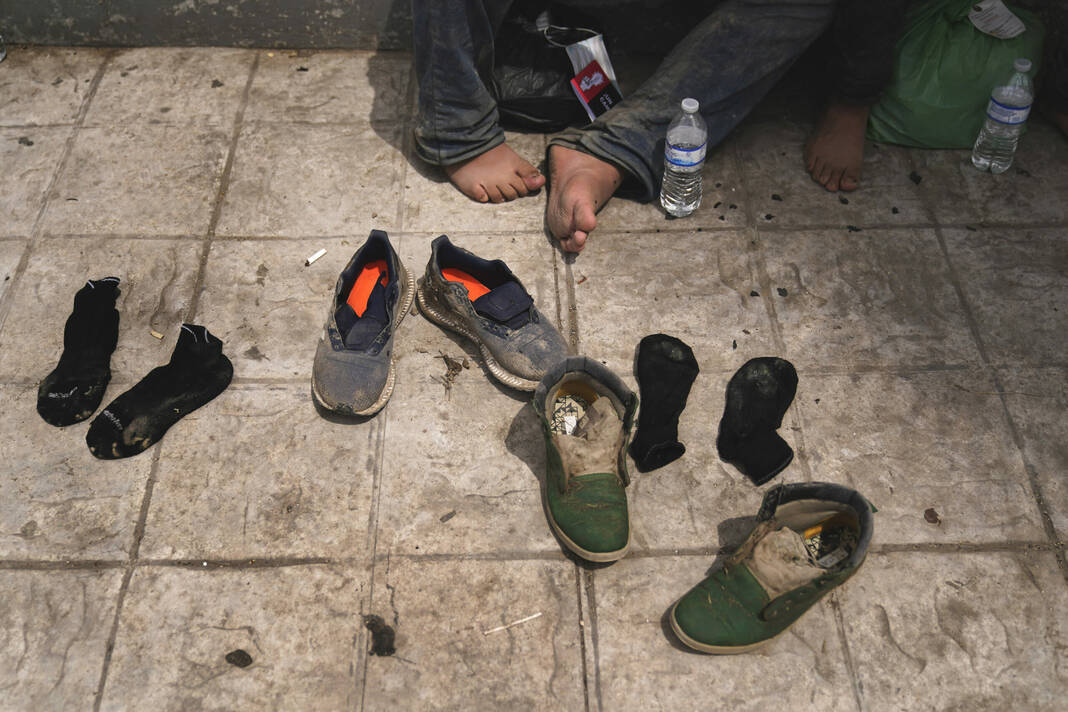As the Biden administration faces a delay to their plans of ending a public health policy barring migrants from seeking asylum at the border, lawmakers bickered in D.C. hearings Wednesday over the effect it’s had on managing immigration. Meanwhile, a new report documenting over 10,000 violent attacks, including murder, against those subjected to the policy was released the same day.
A federal judge on Wednesday granted a restraining order against the Centers for Disease Control and Prevention that will slow down the administration’s wind-down of Title 42, a public health order leveraged since the start of the pandemic to immediately expel migrants seeking asylum.
Originally, the CDC announced they would not continue extending the public health policy and migrants would no longer be sent back under it as soon as May 23. Policy makers are strongly divided on the timing, while researchers are concerned about the effects.
“Title 42 has serious and dire human costs,” Julia Neusner, Human Rights First associate attorney, said Wednesday.
Information collected from newspapers, surveys conducted by legal partners, and other human rights reports were used to compile the spreadsheet of attacks.
In one incident, a mother and her 15-year-old son, who has the functional development of a 5-year-old, crossed into the U.S. seeking refuge after gangs who raped and kidnapped her daughter back home escalated threats against her family. The pair attempted to seek asylum in the U.S. but were sent back twice.
Unaccompanied children are not subject to Title 42 expulsions, so the mother tried sending him alone. According to the immigration attorney who worked with the mother, the son was found dead shortly after with signs of torture and mutilation.
The report published Wednesday focused on the San Diego/Tijuana area.
“We do a lot of research in Ciudad Juarez and Tijuana in part because they’re safer for researchers to go there. Human Rights First has visited Reynosa, Nuevo Laredo and Matamoros and other parts of the border but it’s harder to spend extended periods of time in those places, in part, because of security concerns,” Neusner said.
“We’ve heard for years, especially in Reynosa, about organized criminal groups targeting asylum seekers returned by the U.S. government or stranded there because of U.S. policies,” Neusner added, “including members of organized criminal groups who wait on the bridge to kidnap people as they’re returned from the U.S.”
Migrants waiting in Reynosa created a makeshift camp a block away from the international bridge that spiraled into a dangerous zone where many suffer abuses and other violence.
Human Rights First attempts to educate the public on the effects of U.S. policy on people seeking refuge, but they hope their research reaches those who create policy, as well.
“We’re hoping that policy makers will understand the human impact of Title 42 and other restrictions on asylum at the border and do the right thing and end these policies,” Neusner said.
In D.C., politicians exchanged stern words over such policies with Department of Homeland Security Secretary Alejandro Mayorkas during two hearings held the same day.
“I wish you would resign,” one congressman told Mayorkas.
Another Republican congressman from Mississippi, Rep. Michael Guest, asked him if the border was secure, and Mayorkas said it was. “You’re wrong. You’re not being truthful,” Guest said in an accusatory tone that was chastised by the chairman for a lack of decorum.
More tempered comments were lobbed at the secretary including concerns raised by Democrats, including U.S. Rep. Henry Cuellar, D-Laredo.
“The Laredo sector and the Rio Grande sector are operating at 40%,” Cuellar said. “That means that 60% of men and women are in the processing centers and 40% are actually doing homeland security. It’s like having a school and only 40% of the teachers are in the classrooms and the others are doing something else.”
Mayorkas said they have developed a six-pillar plan published Tuesday that will allow the government to prepare for the end of Title 42. But he expressed frustration with the source of the problem.
“What we fundamentally need is legislation to fix what everyone agrees is a broken immigration system,” Mayorkas said. The tone reverberated with some.
“Right now, Democrats have the House, the Senate and the White House and have done nothing to get comprehensive immigration reform,” Rep. Elissa Slotkin, a Democrat from Michigan, said. “Four years ago the Republicans had the House, the Senate and the White House and did nothing to do comprehensive immigration reform. In Congress, we are most culpable because we are the ones who set the laws.”




